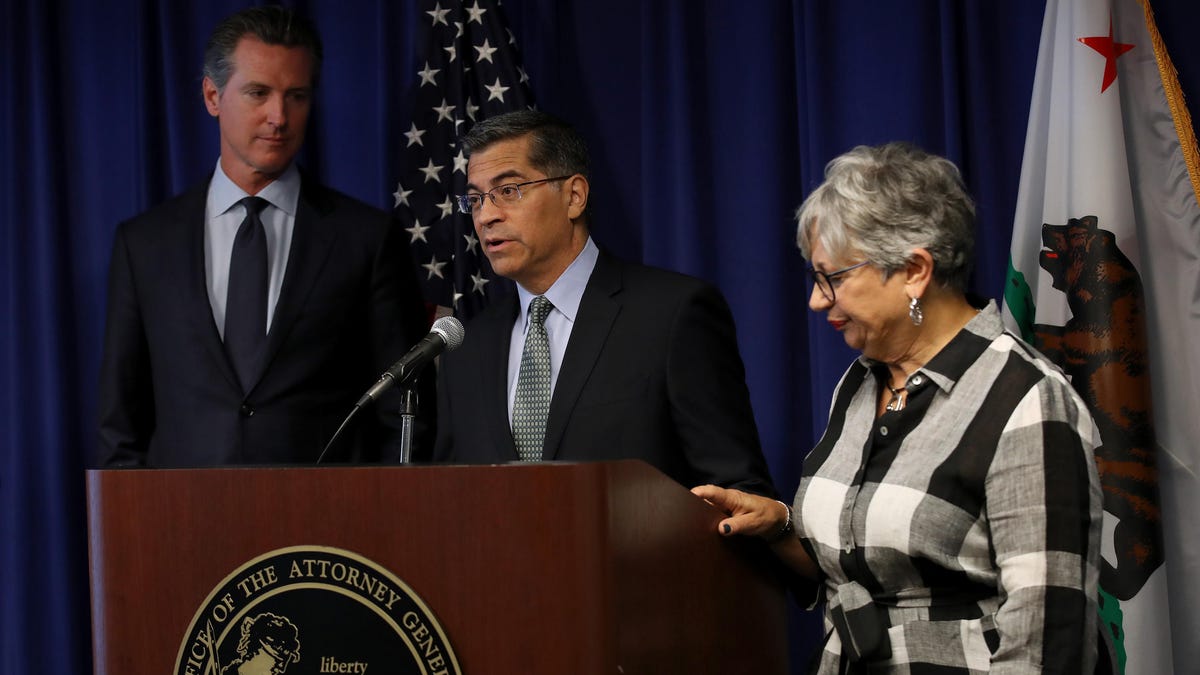California sues Trump administration over revoked clean-car standards
California leads 23 other states also backing the lawsuit after the Trump administration revoked the long-standing waiver process.

California's governor, Gavin Newsom, and attorney general Xavier Becerra, and CARB Chair Mary Nichols at a press conference Friday announcing the lawsuit.
And so it begins. Following news that the Trump administration will revoke California's long-standing waiver process, signed into law as part of the 1970 Clean Air Act, California has fired back with an expected legal challenge.
The California Attorney General's office said on Friday it has filed suit along with 23 other state attorney generals to challenge the revocation of the waiver process. While California has been able to apply for waivers with the EPA for decades, in 2013, the Obama administration's EPA granted a new waiver the Trump administration thinks went too far.
The 23 other states and territories also filing suit along with California are: Colorado, Connecticut, Delaware, Hawaii, Illinois, Maine, Massachusetts, Maryland, Michigan, Minnesota, Nevada, New Jersey, New Mexico, New York, North Carolina, Oregon, Pennsylvania, Rhode Island, Vermont, Virginia, Washington, Wisconsin and the District of Columbia.
Specifically, it granted California the authority to set regulations and standards for greenhouse gas emissions and a mandate for zero-emission vehicles. The state packaged the Advanced Clean Car Standards into a waiver in 2012, which combines smog and greenhouse gas emissions controls into one. Thirteen other states plus Washington, DC, follow the standards. Critics say it's led to a two-pronged standard for automakers, which need to build "compliance cars" to meet these regulations. Often, they are money-losing ventures.
Over the past decades California has filed and received over 100 individual waivers from the EPA to battle its more extreme smog problems in the state.
But that ends with the Trump administration, which began to lay out its course of action for a single national fuel economy and emissions standard this week. On Thursday, the administration rolled out the "One National Program Rule" designed to bar states and local governments from establishing their own separate standards. Still to come are finalized fuel economy and emissions reductions that will likely freeze standards at 2020 levels.
The Obama administration implemented gradual fuel economy increases through 2026 to regulate an average vehicle fleet efficiency of 46.6 miles per gallon. The proposed Trump administration changes will halt increases at 37 mpg through the same time period.
"California won't bend to the President's reckless and politically motivated attacks on our clean car waiver," said Gov. Gavin Newsom. "We'll hold the line in court to defend our children's health, save consumers money at the pump and protect our environment."
California's attorney general, Xavier Becerra, added, "Two courts have already upheld California's emissions standards, rejecting the argument the Trump administration resurrects to justify its misguided Preemption Rule. Yet, the Administration insists on attacking the authority of California and other states to tackle air pollution and protect public health."
EPA Administrator Andrew Wheeler said this week that the end of the waiver process will streamline regulations, save consumers money on new vehicles and help create a level set of rules for automakers to follow.
California retaliated earlier this year as it seemed more likely the Trump administration was ready to revoke its waiver process. The state signed a voluntary greenhouse gas pact with four automakers. Since then, the Trump administration's Department of Justice has begun an antitrust investigation into the agreement. BMW, Ford , Honda and Volkswagen are each involved.
It's unlikely the legal battle will settle until it reaches the Supreme Court. The decision could set a precedent for decades to come.

